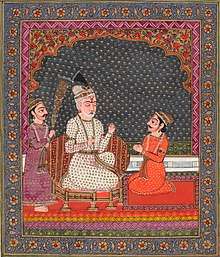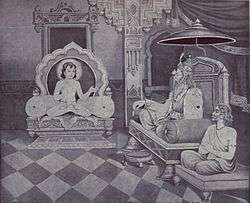Dhritarashtra
In the Hindu epic Mahabharat, King Dhritarashtra (Sanskrit: धृतराष्ट्र) is the King of the Kuru Kingdom with its capital at Hastinapur. He was born to Vichitravirya's first wife Ambika. Dhritarashtra was born blind [1]. He fathered one hundred sons and one daughter, Dushala, by his wife, Gandhari and a son, Yuyutsu, by Sughada, his wife's maid. These children, including the eldest son Duryodhana, came to be known as the Kauravas. Gandhari, his wife, sacrificed her eyesight, as he was blind, by blindfolding herself; hence, she could not see.
| Dhritarashtra | |
|---|---|
| Mahabharata character | |
 The blind king Dhitarastra listens as the visionary narrator Sanjay relates the events of the battle between the Kaurav and the Pandav clans | |
| In-universe information | |
| Weapon | Gada (mace) |
| Family | Ved Vyasa (Surrogate Father) Vichitravirya (Dharmic father) Ambika (mother) Pandu and Vidura (half-brothers) |
| Spouse | Gandhari |
| Children | Sons: 100 sons including Duryodhana, Dushasana and Vikarna (with Gandhari); Yuyutsu (with maid Sughada) Daughter: Dushala (with Gandhari) |
| Religion | Hinduism |
Historicity

A historical Kuru King named Dhritarashtra Vichitravirya is mentioned in the Kathaka Samhita of the Yajurveda (c. 1200–900 BCE) as a descendant of the Rigvedic-era king, Sudas. His cattle was reportedly destroyed as a result of the conflict with the vratya ascetics; however, this Vedic mention does not provide corroboration for the accuracy of the Mahabharata's account of his reign.[2][3]
Birth and Early Life
With Vichitravirya having died of sickness, Bhishma unable to take the throne because of his vow, and Bahlika's line unwilling to leave Bahlika Kingdom, there was a succession crisis in Hastinapur. Satyavati invites her son Vyasa to impregnate the queens Ambika and Ambalika under the Niyoga practice. When Vyasa went to impregnate Ambika, his scary appearance frightened her, so she closed her eyes during their union; hence, her son was born blind.[4]
Dhritarashtra, along with his younger half-brother Pandu is trained in the military arts by Bhishma and Kripacharya. Hindered by his handicap, Dhritarashtra is unable to wield weapons, but has the strength of one hundred thousand elephants due to boon given by Vyasa, and is said to be so strong that he can crush iron with his bare hands.[5]
When it came time to nominate an heir, Vidura suggested that Pandu would be a better fit because he was not blind. Though bitter at the result, Dhritarashtra willingly conceded the crown, though this act would flower into the protectiveness he would have over his crown later in life.[6] Dhritarashtra marries Gandhari of Hastinapur's weakened and lowly vassal Ghandar; Gandhari covers her eyes with cloth in order to better understand her husband's blindness.[7] He and Gandhari had one hundred sons, called the Kauravas and one daughter Dushala. He also had a son named Yuyutsu with a concubine.
Battle of Kurukshetra
Lord Krishna as a peace emissary of Pandavas traveled to Hastinapura persuading Kauravas to avoid bloodshed of their own kin. However, Duryodhana conspired to arrest him that resulted in failure of the mission. After Krishna's peace mission failed and the war seemed inevitable, Vyasa approached Dhritarashtra and offered to grant him divine vision, so that Dhritarashtra could see the war. However, not willing to see his kin slaughtered, Dhritarashtra asked that the boon be given to Sanjaya his charioteer. Sanjaya dutifully narrates the war to his liege, reporting how Bhima killed all his children. Sanjaya would console the blind king while challenging the king with his own viewpoints and morals. When Lord Krishna displayed his Vishvarupa (Universal Form) to Arjuna on the battlefield of Kurukshetra, Dhritarashtra regretted not possessing the divine sight.[5]
Dhritarashtra was confident that Bhishma, Drona, Karna and other invincible warriors would make the Kaurava camp victorious. He rejoiced whenever the tide of war turned against the Pandavas. However, the results of the war devastated him. All of his sons and grandsons were killed in the carnage. Dhritarashtra's only daughter Duhsala was widowed. Yuyutsu had defected to Pandava side at the onset of war and was the only son of Dhritrashtra who had managed to survive Kurukshetra War.[8]
Crushing of Bhima's metal statue

Dhritarashtra was furious with Bhima for mercilessly slaying all his sons, especially Duryodhana. After the war ended, the victorious Pandavas arrived at Hastinapur for the formal transfer of power. The Pandavas go to embrace their uncle and give their respects. Dhritarashtra hugged Yudhishthira heartily. When Dhritarashtra turned to Bhima, Lord Krishna sensed the danger and asked Bhima to move Duryodhana's iron statue of Bhima (used by the prince for training) in his place. Dhritarashtra crushed the statue into pieces, and then broke down crying, his anger leaving him. Broken and defeated, Dhritarashtra apologized for his folly and wholeheartedly embraced Bhima and the other Pandavas.[9]
Later years and death
After the great war of Mahabharata, the grief-stricken blind king along with his wife Gandhari, sister-in-law Kunti, and half brother Vidura left Hastinapur for penance. It is believed that all of them (except Vidura who predeceased him) perished in a forest fire and attained Moksha.[10]
References
- "Hinduism: An Alphabetical Guide", by Roshen Dalal, p. 230, publisher = Penguin Books India
- Witzel, Michael (1995). "Early Sanskritization: Origin and Development of the Kuru state" (PDF). EJVS. 1 (4): 17, footnote 115. Archived from the original (PDF) on 11 June 2007.
- Michael Witzel (1990), "On Indian Historical Writing", p.9 of PDF
- The Sacred books of the Hindus. Genesis Publications. 2007. p. 94.
- Ganguli, Kisari Mohan. The Mahabharata of Krishna-Dwaipayana Vyasa Translated into English Prose by Kisari Mohan Ganguli. N.p.: n.p., n.d. Web.
- Kalyāṇakara, Bā Ha. Dhr̥tarāshṭra. Nāgapūra: Ākāṅkshā Prakāśana, 2007.
- Suri, Chander Kanta. The Life and times of Shakuni. Delhi: for All, 1992. Print
- Yuyutsu was one of the 11 who managed to survive the war.
- During the Kurukshetra War
- Dhritarashtra, Gandhari and Kunti proceed to forest
2017

